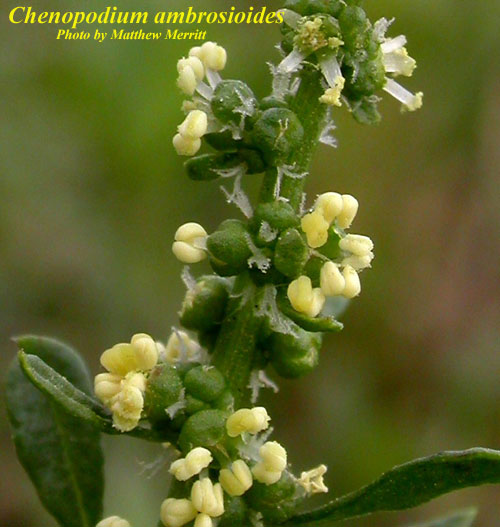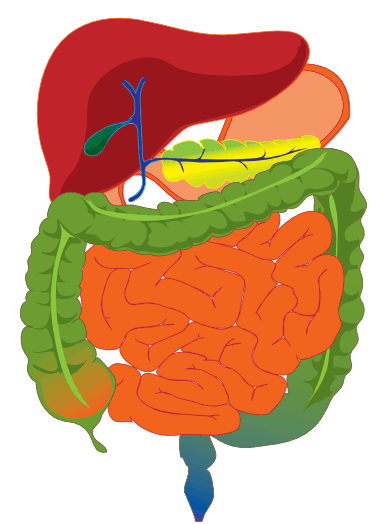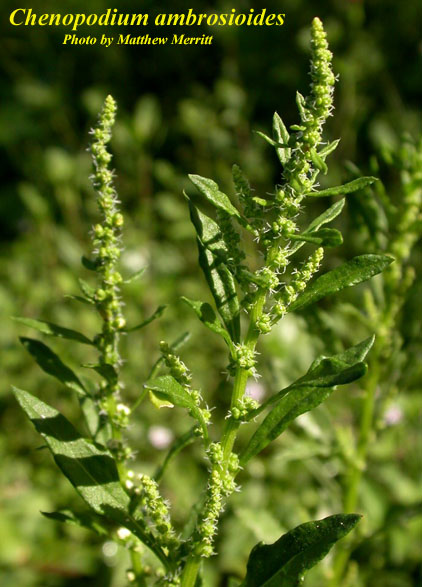Medicinal Uses
This plant, as I’ve mentioned before, has some very unique
characteristics and that is certainly true once one begins to
explore the medicinal properties of Chenopodium ambrosioides.
There are a couple things that you should keep in mind as you
read how this plant can be used in the realm of healing. First
of all there are parts of this plant, mostly the seeds, that
contain an essential oil that if taken in excess is highly toxic
and can cause dizziness, vomiting, convulsions, and even death.
Now this may seem contradictory considering this plant is said
to be widely used for medicinal purposes, but yet could potentially
kill someone? What this comes down to is the lethal dose. If
taken in excess the oils found mainly in the
seeds could have adverse effects, but this is true of almost all
medications taken in excess. But now let's move forward and
explore the many ways Chenopodium a. is being used world wide in
medical practices.
are a couple things that you should keep in mind as you
read how this plant can be used in the realm of healing. First
of all there are parts of this plant, mostly the seeds, that
contain an essential oil that if taken in excess is highly toxic
and can cause dizziness, vomiting, convulsions, and even death.
Now this may seem contradictory considering this plant is said
to be widely used for medicinal purposes, but yet could potentially
kill someone? What this comes down to is the lethal dose. If
taken in excess the oils found mainly in the
seeds could have adverse effects, but this is true of almost all
medications taken in excess. But now let's move forward and
explore the many ways Chenopodium a. is being used world wide in
medical practices.
Chenopodium ambrosioides has long been known and grown for its
uses as a medicinal plant. For centuries this plant has been
used by Southern and Central Americans to rid the body of
parasitic intestinal worms. This
seems to work because the oil contained in the seeds appears to
paralyze the worms when they are in the
intestine. The main active ingredient of the oil is ascaridole,
shown to the left. The effectiveness of the essential oils in
the treatment of intestinal worms has led many scientists over the
last decade or so to investigate the uses of this plant more
extensively. I will discuss many of their findings later in this
section. If you would like to check out another organism that has
been used in medicinal practices for thousands of years take a
gander at
Polyrhachis lamellidens.
the worms when they are in the
intestine. The main active ingredient of the oil is ascaridole,
shown to the left. The effectiveness of the essential oils in
the treatment of intestinal worms has led many scientists over the
last decade or so to investigate the uses of this plant more
extensively. I will discuss many of their findings later in this
section. If you would like to check out another organism that has
been used in medicinal practices for thousands of years take a
gander at
Polyrhachis lamellidens.
If you live in a well-developed country
where infections due to parasitic
intestinal worms are uncommon you may not have heard of this plant
or its uses as a vermifuge. The essential oils extracted from Chenopodium ambrosioides was used very extensively, in fact until
recently it was the most common means to remove intestinal worms
from the GI tract. In the last decade or so there has been a decline
in the usage of this traditional treatment for intestinal worms and
a rise in synthetic drugs to harbor the same effects. However, in
many developing and Central and South American countries this plant
is used as a main means to rid people of parasitic worms. The
oils are effective against a large number of parasites including the
amoeba that causes dysentery, but this oil seems to be less
effective at treating tapeworms. There are many other parasitic
worms that affect humans world-wide, for more information on one
such worm visit, Wuchereria
bancrofti. If you are simply curious about
'critters' that infect the GI tract, as the parasitic worms do that
the oil from Chenopodium ambrosioides is used to treat, check out
Helicobacter pylori,
which can cause stomach ulcers.
the most common means to remove intestinal worms
from the GI tract. In the last decade or so there has been a decline
in the usage of this traditional treatment for intestinal worms and
a rise in synthetic drugs to harbor the same effects. However, in
many developing and Central and South American countries this plant
is used as a main means to rid people of parasitic worms. The
oils are effective against a large number of parasites including the
amoeba that causes dysentery, but this oil seems to be less
effective at treating tapeworms. There are many other parasitic
worms that affect humans world-wide, for more information on one
such worm visit, Wuchereria
bancrofti. If you are simply curious about
'critters' that infect the GI tract, as the parasitic worms do that
the oil from Chenopodium ambrosioides is used to treat, check out
Helicobacter pylori,
which can cause stomach ulcers.
Although this plant is very good at expelling
intestinal worms, here in the United States the oil extracted from
the plant has been replaced by a volatile oil obtained by the
distillation of crushed fruits, to which fruit owes its medicinal
importance to. The essential oil may be being
replaced due to the
mixed results that have been found in numerous studies and noted in
many scientific journals. One such study conducted noted the
tea-like concoction many indigenous peoples
rely on to rid the worms
from their system never actually
yielded a cure, even at maximum doses. This study broke the
participants up into five groups and each group was administered a
concoction with different concentrations of oil. M. Kilks
conducted the study and found that there was only a temporary
depression in the worm egg-counts contained in the feces for the
group that was being administered the highest doses of oil that was
extracted only from the leaves and seeds. There was no curative
effect found from using the essential oil found in Chenopodium a.,
but there was a temporary depression in egg count while the patient
was being administered the oil. Why might this be? The scientists
believe the plant may have irritated the worms in the intestinal
tract and that could explain the relative depression in the release
of eggs. But why then if the plant oil does not cure the patients
are so many people world-wide adamant about the vermifuge nature of
Chenopodium ambrosioides. This particular study points to three main
factors that could explain the discrepancies regarding the
efficiency of the oil. First of all the percent of ascaridole
contained in the plant can vary anywhere from 1-6%, this is
referring to the potency of the plant. Second Many people take varying
doses, which will quite obviously play a role in the effect seen on
the worms and finally there are also many seasonal factors that affect the
host parasite relationship that may play a role in the idea that the
plant ‘cures’ the patients for a time being. The study found
due to the
mixed results that have been found in numerous studies and noted in
many scientific journals. One such study conducted noted the
tea-like concoction many indigenous peoples
rely on to rid the worms
from their system never actually
yielded a cure, even at maximum doses. This study broke the
participants up into five groups and each group was administered a
concoction with different concentrations of oil. M. Kilks
conducted the study and found that there was only a temporary
depression in the worm egg-counts contained in the feces for the
group that was being administered the highest doses of oil that was
extracted only from the leaves and seeds. There was no curative
effect found from using the essential oil found in Chenopodium a.,
but there was a temporary depression in egg count while the patient
was being administered the oil. Why might this be? The scientists
believe the plant may have irritated the worms in the intestinal
tract and that could explain the relative depression in the release
of eggs. But why then if the plant oil does not cure the patients
are so many people world-wide adamant about the vermifuge nature of
Chenopodium ambrosioides. This particular study points to three main
factors that could explain the discrepancies regarding the
efficiency of the oil. First of all the percent of ascaridole
contained in the plant can vary anywhere from 1-6%, this is
referring to the potency of the plant. Second Many people take varying
doses, which will quite obviously play a role in the effect seen on
the worms and finally there are also many seasonal factors that affect the
host parasite relationship that may play a role in the idea that the
plant ‘cures’ the patients for a time being. The study found that
further investigation should be done into determining the
feasibility of producing a more concentrated form of the drug (since
the patients who were administered the highest dosage did tend to
see a decline in egg counts) that could be distributed to the
villages where other forms of modern medication are too expensive
for everyday use by the villagers.
that
further investigation should be done into determining the
feasibility of producing a more concentrated form of the drug (since
the patients who were administered the highest dosage did tend to
see a decline in egg counts) that could be distributed to the
villages where other forms of modern medication are too expensive
for everyday use by the villagers.
Now I know this page seems to contain contradicting information about the true medicinal uses of Chenopodium a. as a vermifuge, but that's because there is conflicting evidence about the plants effectiveness. It has been used for centuries and passed down for generations by the indigenous peoples, but the effectiveness is still being studied. I can not definitively say this form of treatment will work, but I do hope that more research is done. Whether the cure comes from Chenopodium a. or something else I hope one day there are cheap cures for the millions of people world-wide who suffer from parasitic intestinal worms.
Although Chenopodium a. is most
well known as a vermifuge that is not the only medical importance
that it serves. See Fun Facts for a few more
unique medicinal uses.